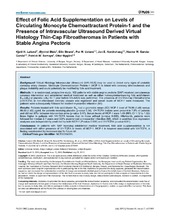Effect of Folic Acid Supplementation on Levels of Circulating Monocyte Chemoattractant Protein-1 and the Presence of Intravascular Ultrasound Derived Virtual Histology Thin-Cap Fibroatheromas in Patients with Stable Angina Pectoris
Løland, Kjetil Halvorsen; Bleie, Øyvind; Strand, Elin; Ueland, Per Magne; Nordrehaug, Jan Erik; Garcia-Garcia, Hector M.; Serruys, Patrick W.; Nygård, Ottar
Peer reviewed, Journal article
Published version
Permanent lenke
https://hdl.handle.net/1956/7989Utgivelsesdato
2013-07-25Metadata
Vis full innførselSamlinger
Originalversjon
https://doi.org/10.1371/journal.pone.0070101Sammendrag
Background: Virtual Histology Intravascular Ultrasound (VH–IVUS) may be used to detect early signs of unstable coronary artery disease. Monocyte Chemoattractant Protein-1 (MCP-1) is linked with coronary atherosclerosis and plaque instability and could potentially be modified by folic acid treatment. Methods: In a randomized, prospective study, 102 patients with stable angina pectoris (SAP) received percutaneous coronary intervention and established medical treatment as well as either homocysteine-lowering folic acid/vitamin B12 (±B6) or placebo (±B6) for 1 year before VH–IVUS was performed. The presence of VH-Thin-Cap Fibroatheroma (VH-TCFA) in non-intervened coronary vessels was registered and serum levels of MCP-1 were measured. The patients were subsequently followed for incident myocardial infarction (MI). Results: Patients treated with folic acid/vitamin B12 had a geometric mean (SD) MCP-1 level of 79.95 (1.49) versus 86.00 (1.43) pg/mL for patients receiving placebo (p-value 0.34). VH-TCFA lesions were present in 7.8% of patients and did not differ between intervention arms (p-value 0.47). Serum levels of MCP-1 were 1.46 (95% CI 1.12 to 1.92) times higher in patients with VH-TCFA lesions than in those without (p-value 0.005). Afterwards, patients were followed for median 2.1 years and 3.8% experienced a myocardial infarction (MI), which in post-hoc Cox regression analyses was independently predicted by both MCP-1 (P-value 0.006) and VH-TCFA (p-value 0.01). Conclusions: In patients with SAP receiving established medical treatment, folic acid supplementation is not associated with either presence of VH-TCFA or levels of MCP-1. MCP-1 is however associated with VH-TCFA, a finding corroborated by increased risk for future MI.

